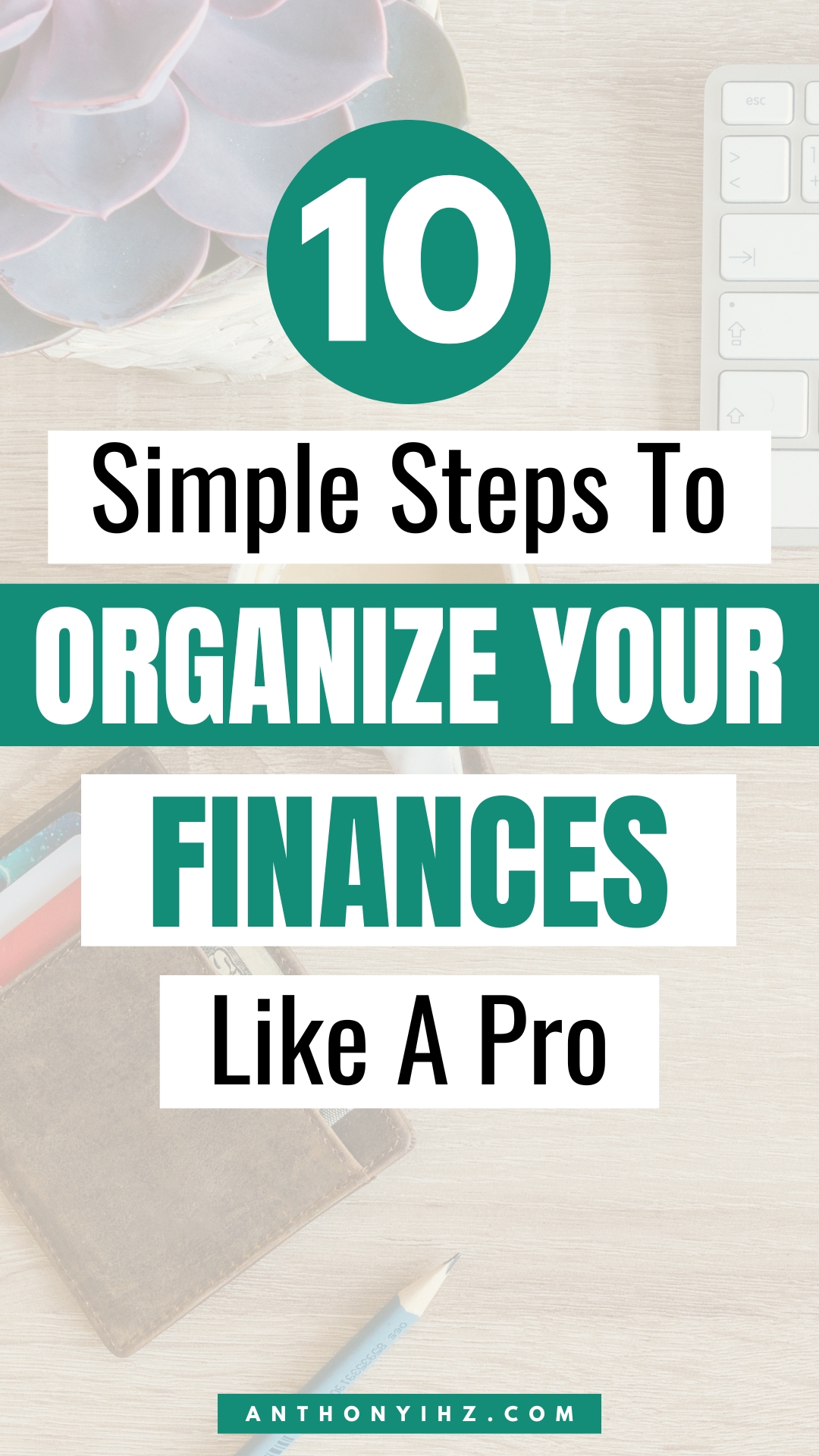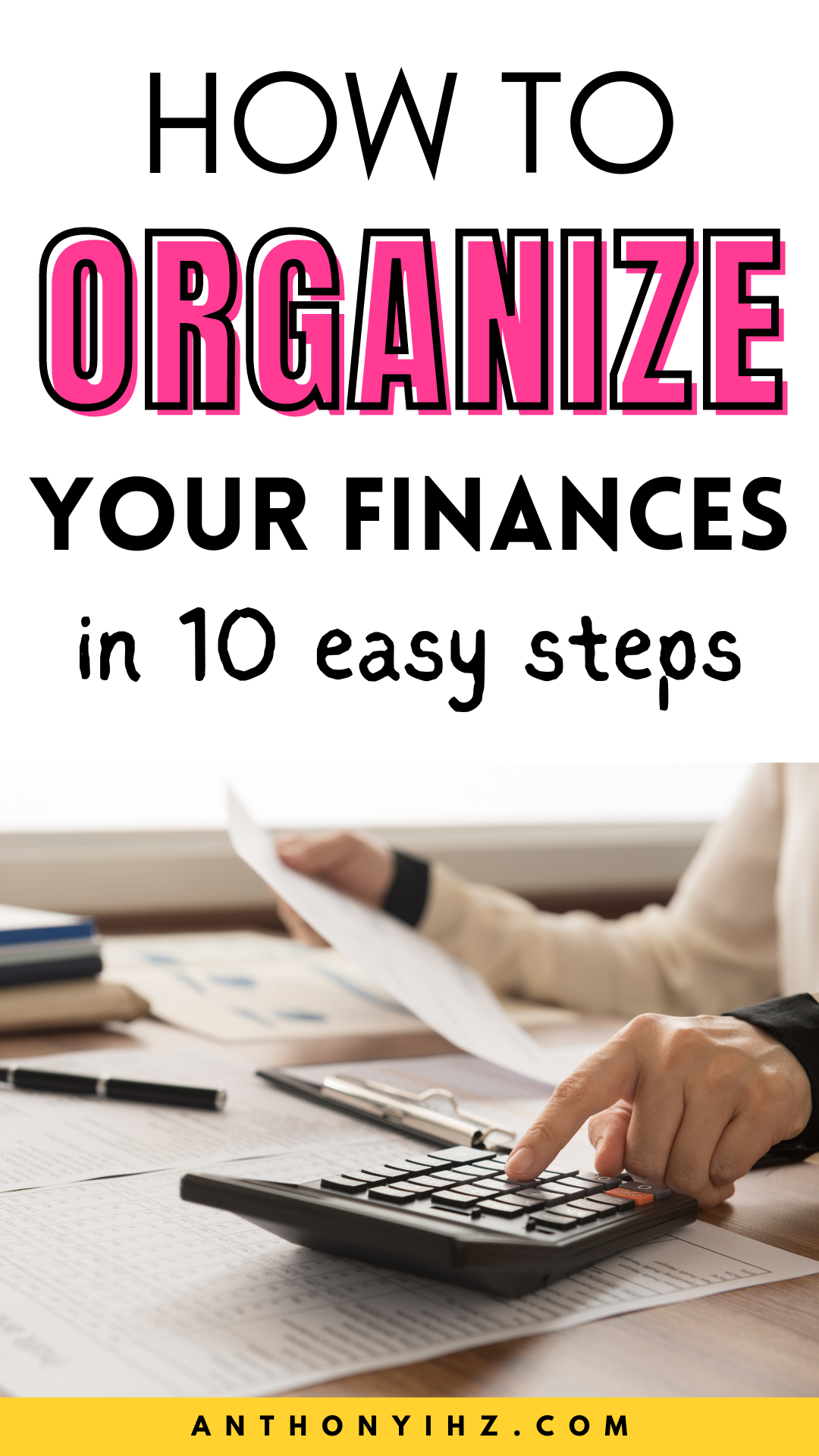
You don’t always have to wait until the beginning of a year before you make financial plans and get better with your money. Knowing how to organize your finances at every point is paramount.
You need to be intentional about saving more money, paying off debt faster, and growing your net worth over time. When it’s time for retirement, the wise decisions you make today will play a major role in cementing your financial freedom.
My main aim in this post is to give you insight into how you can take charge of your financial situation using practical strategies and tips that work for other people. By constantly applying the tips discussed here, there’s no reason you wouldn’t improve your finances.
How Do I Make Sure My Finances Are In Order?
The first step in making sure that your finances are in order is to understand your cash flow. You should be able to accurately give an account of how much you earn and how much you spend every month. With this information, you can easily determine if you’re moving forward financially or not.
The Importance Of Organizing Your Finances
Understanding how to organize your finances may not seem important to you, especially if you aren’t facing any major financial challenges. However, this is as crucial as any other decision you make to improve your well-being. Here are some significant reasons why your finances should be in order:
1. Organizing Your Finances Helps You To Know Your Net Worth
This is one of the most obvious benefits of an organized financial life.
When rich people are asked about their net worth, they certainly have an answer to give. This isn’t because they are simply rich. They know their net worth because they have spent a good amount of time calculating their assets and cash flow.
Regardless of how much you have in your bank account, you can always determine your net worth when your finances are organized. It’s high time you make this a goal.
2. Organizing Your Finances Helps You Save Time And Energy
Going through your financial records when you need a piece of important information can be stressful and tedious. But if your financial records are organized and consolidated, it would seem like you have all the information you need in your palm. This eventually saves you time and energy.
Create a manual spreadsheet or use an efficient online tool to keep track of your expenses and earnings. You wouldn’t have to start searching drawers, shoe boxes, and closets for lost financial documents when you need them.
3. Organizing Your Finances Keeps You In Charge Of Your Financial Situation
When we say someone is “in charge”, it means the person oversees a certain situation and knows exactly what is happening.
When you know how to organize your finances, you will have knowledge of everything that goes on in all your financial accounts. This isn’t just about reading normal debit and credit alerts. Instead, you will be able to determine the implications of certain changes in your finances.
For instance, if your net worth begins to take a nosedive, you’ll notice it immediately and find a solution. This is how you remain in charge.
4. Organizing Your Finances Builds Confidence
The essence of organizing your finances is to create stability and avoid common money problems like credit card debts and unrealistic budgets you can’t stick to. This will then make you confident in your finances, knowing that you have control over everything.
You’ll build confidence in yourself and in your ability to handle the various aspects of your personal finances. From saving for retirement to building an emergency fund and paying rent to settling childcare bills, you’ll have everything under control.

How To Organize Your Finances In 10 Simple Steps
Organizing your finances is a process. It doesn’t happen overnight. You have to systematically do one after the other to arrive at the desired goal. Here are 10 steps to help you get started:
1. Create A Budget
Building a budget is the first recommended step when learning how to organize your finances.
To understand how this works, let’s look at a simple analogy. Imagine you walk into a library and all the books are scattered on the floor. Nothing is arranged on the shelf. This would distort your mind instantly. You won’t be able to find the book you need, let alone relax and have a good reading time. This is how your finances look like without a budget – scattered and disorganized.
You need to build a realistic budget that allows you to plan for your purchases and manage your income brilliantly. You can’t afford to spend money without focus or purpose. You must organize your finances with a good budget.
2. Have Budget Meetings
When you build a budget, you need to hold yourself accountable by having what we call “budget meetings”. This is you getting an accountability partner that monitors your budget along with you, trying to make sure you don’t overspend or do anything funny to ruin the budget.
During these meetings, you are to discuss with your accountability partner the way forward. How better can your money get? Is there a way to make your budget flexible? If there are lapses in your financial plan, how do you fix them? These are things that can be looked at.
3. Monitor Your Transactions
Tracking your transactions is one of the best tips to get your finances organized.
You should know when money comes into your bank account and when money leaves. This is the only way you can ensure that you are working in line with your budget.
When you notice you are about to spend more than you’ve budgeted for a particular spending category, you have to adjust immediately. This will prevent further financial mistakes as you move on with the budget throughout the month.
4. Plan For Miscellaneous Expenses
You should have a spending category for miscellaneous expenses in your budget. This is because as much as you’ve decided to stick to your budget, there will be surprises.
You might even forget to include something in your expenditure. You may need to give pocket money to your kids. A brilliant way of staying ahead of these little expenses is by including them in your budget from the beginning.
This is how to get your finances in order even if you are budgeting money for the first time.
5. Use Two Bank Accounts
This simple strategy is one of the sure ways to be more organized with your money.
You should have one account for paying bills and another one for discretionary spending and savings. This is how you prevent yourself from spending your rent money on an irrelevant purchase.
The account meant for your savings goals will simply protect your money until it is time for it to be withdrawn. Besides, it’s better to assume that you have only one accessible account – where you pay your bills.
For your savings account, just forget about tampering with it.
6. Set Up Direct Deposit For Savings
Here’s one of the best tips to help organize your finances. Making direct deposits to your savings account is a reliable way to reach your savings goal time.
For instance, if you are contributing money toward your retirement account or an emergency fund, you can’t always remember to make these payments unfailingly. This is why direct deposit can be pretty helpful.
However, this depends on your financial situation. If you are currently trying to pay off debt, that should be your main focus. When you become debt-free, you can chase after your long-term savings goals.
7. Pay Your Bills Online
You might be wondering how this helps you learn how to organize your finances. It actually does help.
Now, have you ever forgotten to pay a bill on time online? You were probably asked to pay late fees, which can be quite annoying since you are trying to manage your finances. However, setting up automatic payments for your online bills is such an easy way to avoid unnecessary late fees.
Mind you, ensure you know when these payments will hit your bank account so you can be prepared to cover the bill. What I’m saying is that your account should have enough money when you’re being debited.
8. Use The Envelope Strategy
The envelop strategy is one of the easiest ways to organize your finances. You can literally organize money by putting physical cash in envelopes for all your spending categories (aside from the autopay bills). With this method, you can see how much is left each time you spend. This also means you will be doing most of your shopping with cash, which is a good thing.
Buying things with physical cash can sometimes curb overspending or impulse purchases.
9. Pay Off Debt
It’s almost impossible to keep your finances in order when you have a lot of debt to pay. I usually like to make people see debt this way; it’s like tying up your future finances. You can barely save for personal goals or comfortably cover all your bills (in some cases) when you’re in debt.
Whether it’s a student loan, mortgage, or credit card debt, it’s time you start clearing your debts before your financial situation gets worse. When you are eventually free from debt, you will have the opportunity to stabilize your finances and invest in your future.
10. Avoid The Use Of Credit Cards
I’m not sure everyone in the United States will eventually stop using credit cards. But I know some households that have learned to cut out credit cards permanently.
According to Dave Ramsey, Americans using credit cards have an average balance of $5,474. That’s more than the monthly income of some households. With this kind of debt hanging over your head, how do you intend to be in charge of your financial situation?
As part of learning how to organize your finances, you have to stop using credit cards as soon as possible. This will help you break out of the poor money management system. Besides, if you would like to learn how to pay off your credit card debt faster so you can be free to handle your money confidently, here are some helpful strategies you need to know.
Apps To Organize Your Finances
Having looked at the steps to organize your finances, you may still feel a little bit discouraged due to the time and effort you need to put into this. But finding an efficient tool to do all the work for you makes the whole process quite easy. Here are some helpful apps to manage your finances:
1. Mint

Mint is a free popular budgeting app that allows you to sync all your financial accounts in one place. You can access your bank account, credit cards, loans, or investments with a few clicks using this app. There’s really no better way to take a look at your financial situation on a smartphone.
When it comes to budgeting, Mint offers some of the best features. The app automatically categorizes your transactions linked to your bank accounts and shows you how much you’ve spent so far.
2. You Need A Budget (YNAB)

If you need another budgeting tool to help you learn how to organize your finances, then you should try the YNAB app. It is built around the zero-based budgeting principle. This encourages you to spend money purposefully by giving every dollar in your budget a job.
Whether it’s regarding your monthly bills, savings, or investments, this app makes it easy to allocate your money towards something.
3. Cleo

Cleo is quite different from most money management apps. The AI-powered financial app provides amazing features that allow you to create a personalized budget plan for the month.
The app is programmed to notify you when you are living beyond your means by spending too much. You just have to connect your bank accounts to the app so that it can track all your financial transactions.
Also, Cleo can help you save money faster by setting small amounts for you to save regularly.
4. PocketGuard

The name of the app already tells you how much help it can render to your finances.
PocketGuard is a very efficient money app that lets you sync all your financial accounts, enabling you to access them on the go from one place.
This amazing tool also has a feature called “In my pocket” that tracks your spending and shows you how far you’ve gone with your budget. Basically, PocketGuard curbs overspending and shows you the areas where you can cut back.
5. GoodBudget

GoodBudget is another tool that simplifies the process of building a budget. The app works based on the envelope method, where you allocate a certain amount of money to an envelope (spending category). If you exhaust the money in an envelope, it means your budget for that category is finished.
You can create envelopes for utilities, groceries, rent, transportation, childcare, and more. This is a good way to promote discipline while learning how to organize your finances.
Final Thoughts On How To Organize Your Finances
Now that you know what it takes to put your financial situation in order, you don’t have any excuse to sit back and do nothing. As this post advised, begin with a budget.
Remember how hard you work for your money. Don’t be quick to spend recklessly. Create a working budget that keeps your spending moderate and helps you organize your finances. Besides, you don’t need to bother using a spreadsheet or a sheet of paper and pen to budget money. Since budget apps are now available, you can save time and energy.
Pin this for later!


